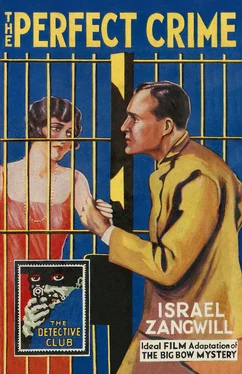INSPECTOR HOWLETT said: About 9:45 on the morning of Tuesday, 4th December, from information received, he went with Sergeant Runnymede and Dr Robinson to 11 Glover Street, Bow, and there found the dead body of a young man, lying on his back with his throat cut. The door of the room had been smashed in, and the lock and the bolt evidently forced. The room was tidy. There were no marks of blood on the floor. A purse full of gold was on the dressing-table beside a big book. A hip-bath with cold water stood beside the bed, over which was a hanging bookcase. There was a large wardrobe against the wall next to the door. The chimney was very narrow. There were two windows, one bolted. It was about eighteen feet to the pavement. There was no way of climbing up. No one could possibly have got out of the room, and then bolted the doors and windows behind him; and he had searched all parts of the room in which anyone might have been concealed. He had been unable to find any instrument in the room, in spite of exhaustive search, there being not even a penknife in the pockets of the clothes of the deceased, which lay on a chair. The house and the back yard, and the adjacent pavement, had also been fruitlessly searched.
SERGEANT RUNNYMEDE made an identical statement, saving only that he had gone with Dr Robinson and Inspector Howlett.
DR ROBINSON, divisional surgeon, said: The deceased was lying on his back, with his throat cut. The body was not yet cold, the abdominal region being quite warm. Rigor mortis had set in in the lower jaw, neck and upper extremities. The muscles contracted when beaten. I inferred that life had been extinct some two or three hours, probably not longer, it might have been less. The bedclothes would keep the lower part warm for some time. The wound, which was a deep one, was five and a half inches from right to left across the throat to a point under the left ear. The upper portion of the windpipe was severed, and likewise the jugular vein. The muscular coating of the carotid artery was divided. There was a slight cut, as if in continuation of the wound, on the thumb of the left hand. The hands were clasped underneath the head. There was no blood on the right hand. The wound could not have been self-inflicted. A sharp instrument had been used, such as a razor. The cut might have been made by a left-handed person. No doubt death was practically instantaneous. I saw no signs of a struggle about the body or the room. I noticed a purse on the dressing-table, lying next to Madame Blavatsky’s big book on Theosophy. Sergeant Runnymede drew my attention to the fact that the door had evidently been locked and bolted from within.
By a JURYMAN: I do not say the cuts could not have been made by a right-handed person. I can offer no suggestion as to how the inflicter of the wound got in or out. Extremely improbable that the cut was self-inflicted. There was little trace of the outside fog in the room.
POLICE-CONSTABLE WILLIAMS said he was on duty in the early hours of the morning of the 4th inst. Glover Street lay within his beat. He saw or heard nothing suspicious. The fog was never very dense, though nasty to the throat. He had passed through Glover Street about half-past four. He had not seen Mr Mortlake or anybody else leave the house.
The Court here adjourned, the Coroner and the jury repairing in a body to 11 Glover Street to view the house and the bedroom of the deceased. And the evening posters announced: ‘The Bow Mystery Thickens’.
BEFORE the inquiry was resumed, all the poor wretches in custody had been released on suspicion that they were innocent; there was not a single case even for a magistrate. Clues, which at such seasons are gathered by the police like blackberries off the hedges, were scanty and unripe. Inferior specimens were offered them by bushels, but there was not a good one among the lot. The police could not even manufacture a clue.
Arthur Constant’s death was already the theme of every hearth, railway carriage and public house. The dead idealist had points of contact with so many spheres. The East End and West End alike were moved and excited, the Democratic Leagues and the Churches, the Doss-houses and the Universities. The pity of it! And then the impenetrable mystery of it!
The evidence given in the concluding portion of the investigation was necessarily less sensational. There were no more witnesses to bring the scent of blood over the coroner’s table; those who had yet to be heard were merely relatives and friends of the deceased, who spoke of him as he had been in life. His parents were dead, perhaps luckily for them; his relatives had seen little of him, and had scarce heard as much about him as the outside world. No man is a prophet in his own country, and, even if he migrates, it is advisable for him to leave his family at home. His friends were a motley crew; friends of the same friend are not necessarily friends of one another. But their diversity only made the congruity of the tale they had to tell more striking. It was the tale of a man who had never made an enemy even by benefiting him, nor lost a friend even by refusing his favours; the tale of a man whose heart overflowed with peace and goodwill to all men all the year round; of a man to whom Christmas came not once, but three hundred and sixty-five times a year; it was the tale of a brilliant intellect, who gave up to mankind what was meant for himself, and worked as a labourer in the vineyard of humanity, never crying that the grapes were sour; of a man uniformly cheerful and of good courage, living in that forgetfulness of self which is the truest antidote to despair. And yet there was not quite wanting the note of pain to jar the harmony and make it human. Richard Elton, his chum from boyhood, and vicar of Somerton in Midlandshire, handed to the coroner a letter from the deceased about ten days before his death, containing some passages which the coroner read aloud: ‘Do you know anything of Schopenhauer? I mean anything beyond the current misconceptions? I have been making his acquaintance lately. He is an agreeable rattle of a pessimist; his essay on “The Misery of Mankind” is quite lively reading. At first his assimilation of Christianity and Pessimism (it occurs in his essay on “Suicide”) dazzled me as an audacious paradox. But there is truth in it. Verily, the whole creation groaneth and travaileth, and man is a degraded monster, and sin is over all. Ah, my friend, I have shed many of my illusions since I came to this seething hive of misery and wrongdoing. What shall one man’s life—a million men’s lives—avail against the corruption, the vulgarity and the squalor of civilization? Sometimes I feel like a farthing rushlight in the Hall of Eblis. Selfishness is so long and life so short. And the worst of it is that everybody is so beastly contented. The poor no more desire comfort than the rich culture. The woman to whom a penny school fee for her child represents an appreciable slice of her income is satisfied that the rich we shall always have with us.
‘The real crusted old Tories are the paupers in the Workhouse. The Radical working men are jealous of their own leaders, and the leaders of one another. Schopenhauer must have organized a labour party in his salad days. And yet one can’t help feeling that he committed suicide as a philosopher by not committing it as a man. He claims kinship with Buddha, too; though Esoteric Buddhism at least seems spheres removed from the philosophy of “The Will and the Idea”. What a wonderful woman Madame Blavatsky must be. I can’t say I follow her, for she is up in the clouds nearly all the time, and I haven’t as yet developed an astral body. Shall I send you on her book? It is fascinating…I am becoming quite a fluent orator. One soon gets into the way of it. The horrible thing is that you catch yourself saying things to lead up to “Cheers” instead of sticking to the plain realities of the business. Lucy is still doing the galleries in Italy. It used to pain me sometimes to think of my darling’s happiness when I came across a flat-chested factory girl. Now I feel her happiness is as important as a factory girl’s.’
Читать дальше












